Fake News, Propaganda, and Plain Old Lies
Fake News, Propaganda, and Plain Old Lies
How to Find Trustworthy Information in the Digital Age
Donald A. Barclay
Rowman & Littlefield
Lanham Boulder New York London
Published by Rowman & Littlefield
An imprint of The Rowman & Littlefield Publishing Group, Inc.
4501 Forbes Boulevard, Suite 200, Lanham, Maryland 20706
www.rowman.com
Unit A, Whitacre Mews, 26-34 Stannary Street, London SE11 4AB
Copyright 2018 by The Rowman & Littlefield Publishing Group, Inc.
All rights reserved. No part of this book may be reproduced in any form or by any electronic or mechanical means, including information storage and retrieval systems, without written permission from the publisher, except by a reviewer who may quote passages in a review.
British Library Cataloguing in Publication Information Available
Library of Congress Cataloging-in-Publication Data
Names: Barclay, Donald A. author.
Title: Fake news, propaganda, and plain old lies : how to find trustworthy information in the digital age / Donald A. Barclay.
Description: Lanham : Rowman & Littlefield, 2018. | Includes bibliographical references and index.
Identifiers: LCCN 2017051583 (print) | LCCN 2017053314 (ebook) | ISBN 9781538108901 (electronic) | ISBN 9781538108895 (hardback : alk. paper)
Subjects: LCSH: Fake news. | JournalismHistory21st century. | Online journalism.
Classification: LCC PN4784.F27 (ebook) | LCC PN4784.F27 B37 2018 (print) | DDC 070.4/3dc23
LC record available at https://lccn.loc.gov/2017051583
 The paper used in this publication meets the minimum requirements of American National Standard for Information SciencesPermanence of Paper for Printed Library Materials, ANSI/NISO Z39.48-1992.
The paper used in this publication meets the minimum requirements of American National Standard for Information SciencesPermanence of Paper for Printed Library Materials, ANSI/NISO Z39.48-1992.
Printed in the United States of America
To my lovely family:
Alexandra, Emily, Tess, and Caroline.
Love to you all.
Contents
Preface
Why Read a Book by a Librarian?
As a topic of debate and discussion, fake news really blew up during the homestretch of the 2016 US presidential election. A search of the New York Times database from July 1, 2016, to December 31, 2016, turns up 319 articles in which the phrase fake news appears. An identical search covering the same time span turns up 151 such articles in the Wall Street Journal . Tallying up the number of social media posts about fake news during the last half of 2016 is impossible, but all the evidence points to the fact that the topic was as big on social media as it was in the traditional news media. And remains so.
At the time when now-familiar phrases such as fake news and alternative facts started regularly appearing in the media (social and news), at least part of the population reacted with surprise if not shock. For me, however, the stories about fake news came as no surprise. As someone who has worked as an academic librarian since 1990 (and who, prior to that, spent four years teaching research-based college writing), teaching people to think critically about how they evaluate, internalize, and apply information has been a major part of my job for most of my working life. Information literacy is something I have pondered, studied, practiced, and written about for going on three decades.
For those not familiar with the jargon of the library profession, information literacy (a phrase that was coined in 1974) describes the efforts of librarians to help people think critically about what they read, hear, and see. Of course, even before the phrase information literacy entered the professional lexicon, librarians were actively engaged in teaching people how to negotiate increasingly complex information environments. Evidence exists of library instruction dating back to the 1820s at Harvard University. Courses on using libraries emerged at a number of colleges and universities after the Civil War. Until well into the twentieth century, however, librarians largely focused their instructional efforts on giving tours of library buildings and teaching the use of the local card catalog. Beginning in the 1960s, the role of librarians in instruction was broadened due to such factors as increases in the sheer size of library collections; the emergence of such technologies as microfilm, photocopiers, and classroom projection; and new educational emphases on active-learning techniques like self-directed learning and group participation. Rather than teaching people how to locate items in a given library, practitioners of information literacy recognized that all learners must be equipped with the transferable skills required to identify, organize, and cite information. Even more importantly, information literacy embraced teaching people how to critically evaluate the credibility and appropriateness of information sources; as it turns out, information literacy has always been about teaching the very skills a person needs to navigate todays complex information landscape, a landscape that includes wide swaths of fake news.
In the digital world, information literacy is a far more complex subject than in those times when almost all information came in a physical package of one form or another. Before the web really caught on in the mid to late 1990s, the average persons hunting ground for information was located entirely in the nondigital world and, by the standards of the twenty-first century, was rather limited: subscriptions to a local newspaper and perhaps a handful of national magazines, whatever books were included in ones personal library, the content of television and radio broadcasts, plus the collections of the nearest academic or public libraries. In so limited a universe of information, achieving information literacywhile still a challengewas less daunting than it is in a digital world where information overload is the one constant, and the old standards of objectivity and factuality seem to have been tossed into the same waste bin containing the pay phone and the foldable road map.
Anyone who wishes to make sense of so crowded and chaotic a landscape would do well to seek out a seasoned guide. Perhaps a guide like me: an information professional who started his career in a nondigital world, transitioned to the digital world, and has devoted thousands of hours to helping people like you become independent, information-literate thinkers.
The Impact of Fake News on Information Literacy
As a librarian and an author, I see the explosion of interest in fake news as both a blessing and a curse. The blessing is that the interest in fake news has created a great opportunity for teaching people to become more information literate. Historically, schools and colleges have treated information literacy as something of an orphan subject, never providing it with the type of permanent administrative home enjoyed by service courses like freshman writing or introductory mathematics. As the domain of librarians rather than teaching faculty, full-fledged courses in information literacy have been few; instead, information literacy was something for the librarians to cover during a fifty-minute visit with a freshman writing course full of unmotivated students, most of whom did not understand that what the librarian was yakking about had the potential to improve both their grades and their lives. Since fake news (the topic) started making headlines, however, the situation has improved, with interest in information literacy hitting new highs. Colleges and universities are suddenly offering courses on fake news, including for-credit courses taught by nonlibrarian faculty. Outside of educational institutions, ordinary people are seeking guidance on how to sort out trustworthy information from the torrent of unreliable chatter. Truth is, this book would not exist if the fake news phenomenon had not created a demand that the publisher of this book believes will translate into sales and profits.
Next page
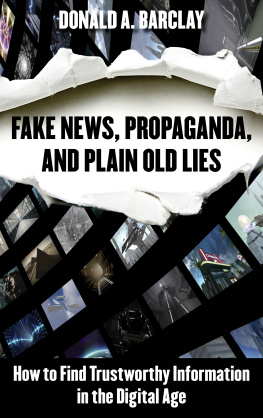
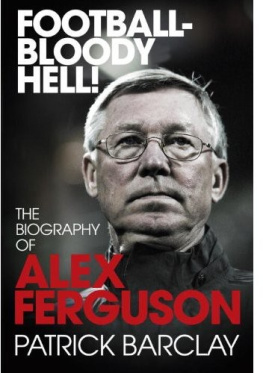

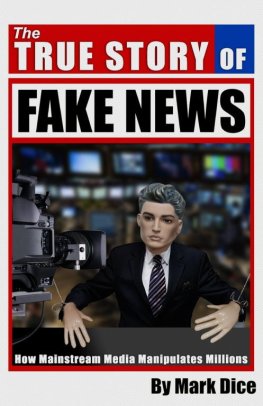
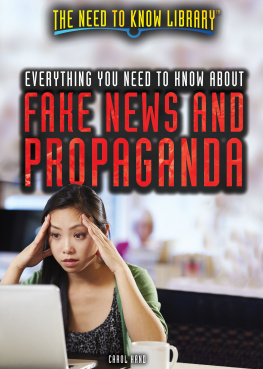
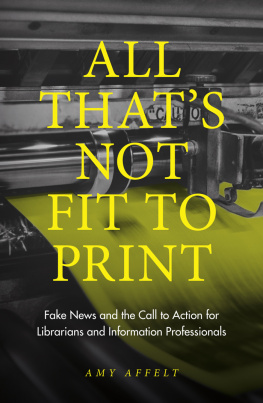
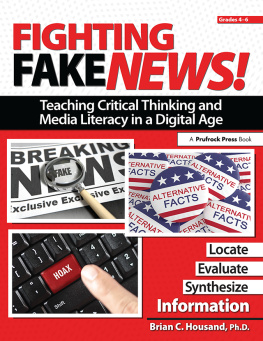
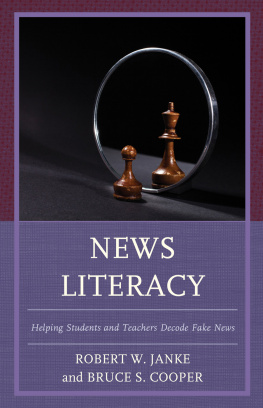
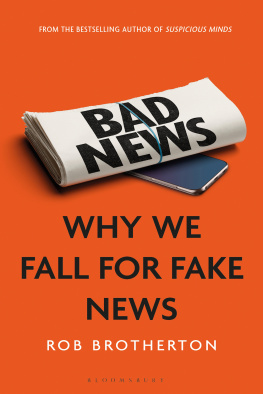
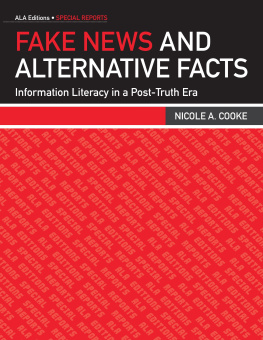
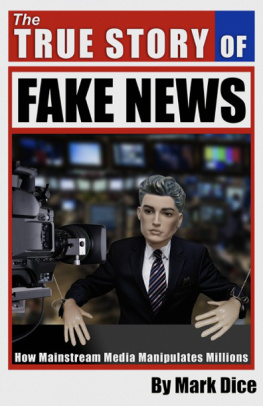
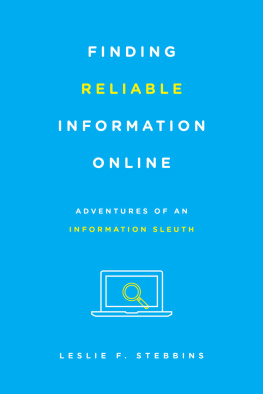
 The paper used in this publication meets the minimum requirements of American National Standard for Information SciencesPermanence of Paper for Printed Library Materials, ANSI/NISO Z39.48-1992.
The paper used in this publication meets the minimum requirements of American National Standard for Information SciencesPermanence of Paper for Printed Library Materials, ANSI/NISO Z39.48-1992.